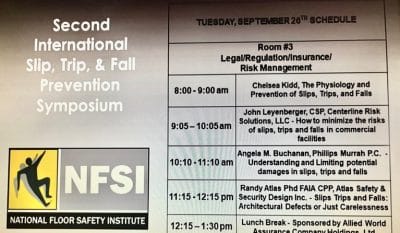Coefficient of friction testing
The coefficient of friction testing measures the ease with which two surfaces in contact slide past one another.
There are two different values associated with the coefficient of friction—static and kinetic. Static friction applies to the force necessary to initialize motion between the two surfaces, and kinetic friction is the resistance to sliding once the surfaces are in relative motion.
Because substrate cleanliness is critically important to gathering reliable data, appropriate measures should be addressed before testing and taken during testing to ensure freedom from dirt, grease, and other contaminants that could adversely affect test results.
ASTM (American Society of Testing Materials) and NFSI (National Floor Safety Institute) are the main coefficient of friction testing standards used by many industries whose needs vary widely. From testing to cleaning procedures, Atlas Safety & Security Design Inc. provides experience and expertise that help ensure that customers get the most value possible from their testing and operations. Expert testimony on slip-and-fall accidents is available for both plaintiff and defense cases.
Dr. Atlas presented a paper at the 2nd International Slip, Trip, and Fall Prevention Symposium on the role of architecture in accidents and the role of human factors and ergonomics in accidents.
Whether analyzing the adequate or negligent security practices and technologies of a property, the human factors and ergonomics of a slip trip and fall accident, or conducting an architectural forensic analysis of a jail or prison suicide, the Atlas Safety & Security Design Inc. team of professionals provides expert support to resolve the disputes of clients. We provide expert testimony support and consultation from early case assessment and discovery through final resolution and trial, relying on real-world practical experience, strong academic and professional credentials, and extensive practical knowledge of customs and practices.
Coefficient of friction (COF) testing measures a material’s frictional characteristics by measuring the force required to slide two surfaces past each other. The COF is a dimensionless number calculated by dividing the frictional force by the normal force pressing the two surfaces together.
Lubricants, Films, Ceramic tiles, Plastics, Textiles, Sheeting, Coated metals, Leather printed cartons, Packaging substrates, and Paper.
The test involves sliding a weight (sled) over a flat surface (plane) and measuring the force during the sliding motion. The plane can be stationary with a moving sled, or the sled can be stationary against a moving plane. The surfaces of both the sled and the plane are usually covered with the material being tested.
COF testing measures two different values of friction: static and kinetic:
- Static friction: The force required to start motion between the two surfaces
- Kinetic friction: The resistance to sliding once the surfaces are moving relative to each other
Contact Us
We’re here to help.
An Atlas Professional is standing by, ready to assist you.
333 Las Olas Way, Suite 1605
Ft Lauderdale, FL 33301
Ph: (305) 332-6588
Our Security & CPTED Book
Designing for Critical Infrastructure Protection and Crime Prevention



